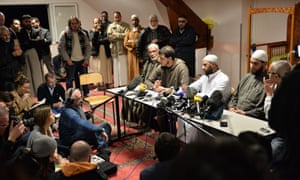
The beige, two-storey, housing association house in a quiet cul-de-sac in the French cathedral city of Chartres was as unremarkable as Omar Ismail Mostefai himself had seemed to neighbours when he lived there for several years until 2012.
“His wife didn’t work and they had a very young daughter, nothing stood out,” said the couple who lived opposite. “He was 25 at the time. He always wore trainers and a cap, he was tall, he had long hair and a short beard and didn’t dress in a religious way. He didn’t work regularly, he had temporary jobs. There didn’t seem to be anything odd. He didn’t have visits,” the woman said.
Three years after his neighbours last saw him, Mostefai, 29, was one of three unmasked men who pulled up in a black Polo car in Paris on Friday night and entered a rock gig at the Bataclan concert hall before opening fire on the crowd with Kalashnikovs. Terrified survivors spoke of utter “carnage”, in which the men shot at random and, when people threw themselves to the ground, turned their automatic weapons on them and kept firing. At least 89 people died there in the bloodiest of the coordinated attacks.
If Mostefai was the first to be identified of the seven dead gunmen and suicide bombers who carried out Friday night’s simultaneous attacks across Paris, it was because a severed fingertip allowed police to match his prints to the record of a driving offence.
Mostefai was French and was born and grew up on an estate in Courcouronnes in Essonne, 25km south of Paris. His parents, or at least his father, is believed to have been of Algerian descent. His profile and life history will be pored over by police and politicians grappling with the issue of homegrown terrorism — attackers who, like in the Charlie Hebdo and kosher grocery store massacres of January — were French born and bred and targeted France.
The estate where Mostefai grew up, Le Canal, in Courcouronnes, is calm and low-rise with buildings that are well cared for, many shops, a post office and a canal where one person had set up a fishing rod on Sunday afternoon. It is ethnically diverse, has a young population and a high proportion of social housing. It does not have decaying towerblocks, nor does it share the reputation of other much tougher estates in neighbouring Évry or nearby in Grigny.
But the banlieue question of the French attackers who grew up in the poor, segregated suburbs will now once again be pushed to the fore in the current atmosphere of political debate dominated by the rise of the far right and questions of national identity.
After January’s attacks by young men from poor backgrounds, the prime minister, Manuel Valls, who was once mayor of Évry, made the most damning indictment yet of the country’s longstanding bitter social divide, saying there was “territorial, social and ethnic apartheid” in France.
“We mustn’t tarnish everyone who lives on estates, that would be a real problem for France,” warned a retired Air France worker in Courcouronnes on Sunday.
Amedy Coulibaly, the gunman who killed a female police officer then killed four in the kosher grocery siege in the same wave as the Charlie Hebdo attacks, came from the tough Grande Borne estate in Grigny only four miles away from where Mostefai grew up. Coulibaly was a convicted armed robber who had done time in France’s notorious Fleury-Mérogis prison, where he was radicalised. Mostefai had never been in prison but was convicted eight times for petty crime between the ages of 19 and 25. These included driving without a licence. It was not clear if he had had any involvement in small-scale drug dealing.
One man who was at high school with him said: “He wasn’t a troublemaker. He was someone who stood up for himself; you wouldn’t provoke him because you knew that he’d stand up for himself if you did. But he wasn’t someone who went looking for problems. He was calm; he wasn’t someone who you’d notice, who stood out.”
After January’s attacks by young men from poor backgrounds, the prime minister, Manuel Valls, who was once mayor of Évry, made the most damning indictment yet of the country’s longstanding bitter social divide, saying there was “territorial, social and ethnic apartheid” in France.
“We mustn’t tarnish everyone who lives on estates, that would be a real problem for France,” warned a retired Air France worker in Courcouronnes on Sunday.
Amedy Coulibaly, the gunman who killed a female police officer then killed four in the kosher grocery siege in the same wave as the Charlie Hebdo attacks, came from the tough Grande Borne estate in Grigny only four miles away from where Mostefai grew up. Coulibaly was a convicted armed robber who had done time in France’s notorious Fleury-Mérogis prison, where he was radicalised. Mostefai had never been in prison but was convicted eight times for petty crime between the ages of 19 and 25. These included driving without a licence. It was not clear if he had had any involvement in small-scale drug dealing.
One man who was at high school with him said: “He wasn’t a troublemaker. He was someone who stood up for himself; you wouldn’t provoke him because you knew that he’d stand up for himself if you did. But he wasn’t someone who went looking for problems. He was calm; he wasn’t someone who you’d notice, who stood out.”
Δεν υπάρχουν σχόλια:
Δημοσίευση σχολίου